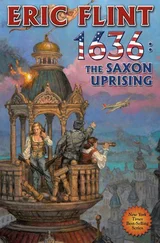Eric Flint - 1634 - The Bavarian Crisis
Здесь есть возможность читать онлайн «Eric Flint - 1634 - The Bavarian Crisis» весь текст электронной книги совершенно бесплатно (целиком полную версию без сокращений). В некоторых случаях можно слушать аудио, скачать через торрент в формате fb2 и присутствует краткое содержание. Жанр: Альтернативная история, на английском языке. Описание произведения, (предисловие) а так же отзывы посетителей доступны на портале библиотеки ЛибКат.
- Название:1634: The Bavarian Crisis
- Автор:
- Жанр:
- Год:неизвестен
- ISBN:нет данных
- Рейтинг книги:5 / 5. Голосов: 1
-
Избранное:Добавить в избранное
- Отзывы:
-
Ваша оценка:
- 100
- 1
- 2
- 3
- 4
- 5
1634: The Bavarian Crisis: краткое содержание, описание и аннотация
Предлагаем к чтению аннотацию, описание, краткое содержание или предисловие (зависит от того, что написал сам автор книги «1634: The Bavarian Crisis»). Если вы не нашли необходимую информацию о книге — напишите в комментариях, мы постараемся отыскать её.
1634: The Bavarian Crisis — читать онлайн бесплатно полную книгу (весь текст) целиком
Ниже представлен текст книги, разбитый по страницам. Система сохранения места последней прочитанной страницы, позволяет с удобством читать онлайн бесплатно книгу «1634: The Bavarian Crisis», без необходимости каждый раз заново искать на чём Вы остановились. Поставьте закладку, и сможете в любой момент перейти на страницу, на которой закончили чтение.
Интервал:
Закладка:
"It needs one more fitting. Unquestionably! Without any doubt. It must be done, Your Highness!"
Thus spake the redoubtable Frau Stecher, the court's chief seamstress. Maria Anna managed to suppress a sigh. The young archduchess' life had been filled with it must be done! followed by it is your clear duty! or it is God's will! for as long as she could remember. Obediently, she stood for the fitting.
"Ach," said Frau Stecher. "Where are my tack pins? Susanna, go get them. A round box, light blue enamel, with an iris on the top. It should be on the far end of the cutting table." One of the assistants rose from where she had been holding a hem, curtsied, and backed neatly out of the room. The girl was new, Maria Anna remembered, the most junior of Frau Stecher's senior apprentices. She, too, had arrived last week with the group sent from Tyrol by Duchess Claudia, with the highest recommendations-daughter of Claudia's own seamstress, stepdaughter of the head court tailor in the Tyrol. At eighteen, she had already acquired all the fundamentals for a successful career in luxury and couture clothing, but would benefit from two or three more years of experience at an even more distinguished court. All the proper flourishes for a letter of recommendation. The Vienna Hofstaat had been delighted to add her to its personnel roster.
What is her name? the archduchess asked herself. Oh, yes. Allegretti. Susanna Allegretti. Unlike many highborn ladies, Maria Anna was punctilious about knowing the names of all of her staff.
After all the challenges associated with tack pins had been resolved, Maria Anna did manage to get into her habit and out the door, where the empress, Eleonora Gonzaga, was waiting for her. As she curtsied, Maria Anna's mind went back to The Sound of Music. There were probably people who thought that her stepmother wasn't an equal match for her father the emperor, either. When Papa had been simply archduke of Styria, Carinthia, and Carniola, no one had thought it amiss that he'd married Maria Anna's mother, who was a sister of the duke of Bavaria. That was equal enough. But by the time he'd married Eleonora Gonzaga, he was already Ferdinand II, king of Hungary, king of Bohemia, Holy Roman Emperor-and she was just a collateral relative of the duke of Mantua.
But the Jesuits said they were both faithful, virtuous, and religious; that they would be happy together, so the match went through. Lucky for him; lucky for us, Maria Anna mused, not for the first time. She always thought of her stepmother as "Mama," and-now that she had seen that marvelous American play-she knew that Eleonora Gonzaga had blessed the House of Habsburg as much as Maria had blessed the von Trapp household.
Curtsey completed, she gave her stepmother a hug and an enthusiastic kiss on both cheeks. Maria Anna adored the pious, childless, woman who, as that young, orphaned, Mantuan duchess, had come to Austria from a modern education in an Ursuline convent. Eleonora Gonzaga had dug her stepchildren out of the clutches of Spanish-model court protocol, and, in line with the best and most progressive Italian views on bringing up children, took them outdoors to run in sunshine and rain, dig in the gardens, hike, ride, and, yes, birdwatch.
There was no doubt about it, Maria Anna realized. She herself, her brothers, and her sister were now the most abundantly healthy young adults the Habsburgs had produced in a long time. Papa himself proclaimed to anyone who would listen that, "Under God, it is to Eleonora's care that I owe my continued life and such health as I have."
And he was quite right!
Dona Mencia de Mendoza and her rheumatic knees did not join the birdwatching expedition. Dona Mencia had come from Spain three years before, in 1630, in the entourage of the Infanta Mariana, Maria Anna's sister-in-law, wife of Maria Anna's brother Ferdinand.
Almost at once, she and the older of the two archduchesses had liked one another. She had found it no hardship whatsoever to transfer to Maria Anna's household, even though working for that energetic young woman was sometimes strenuous. If she weren't doing it, she thought with some amusement, another equally elderly woman would be. What was the function of a chief attendant if not to squelch, when necessary, the youthful exuberance and ebullience to which even Habsburgs were sometimes prone?
Blessed with two to three hours of quiet time, now, she wrapped those aching knees in tubes of toweling loosely stuffed with dried beans that her maid had warmed in front of the fire and settled in to catch up on her correspondence. First, from her mother in Spain. Dona Elvira was not far from her eightieth birthday. If not immortal, she appeared to be giving immortality a good chase. The contents were predictable: land and finances, estates and household, grandchildren and great-grandchildren. Not to mention a new recipe for melon relish.
Duty done, Dona Mencia proceeded to a long letter and thick packet of attachments from her brother, Cardinal Bedmar.
Oh, my! Alphonso would be having an interesting year, what with having been assigned to represent the Cardinal-Infante's interests in Venice while the Americans were there! Her next letter should be addressed to him in Venice.
Dona Mencia leaned back, anticipating a good read.
Duchess Claudia's Kapellmeister, Johann Stadelmayr, had just completed reading a short biography of a great Austrian composer named Franz Joseph Haydn. This had been located, the master of musicians explained to the audience, in a great compendium of knowledge called an encyclopedia.
Everybody in the audience realized, without question, that this compendium must have been located by someone who had been sent to visit the pestilential ally of the misbegotten Swedish king and the miserably ungrateful Bohemian rebel. The music master tactfully refrained from saying so, of course. But the dates of birth and death that he had listed for the composer made it impossible to doubt that someone from the court of Tyrol, or hired by the court of Tyrol, had been to this Grantville.
It probably hadn't been the music master himself, however, Maria Anna thought. He didn't speak much German, so he had read the biography in Italian. That was fine with the Viennese Hof. Everybody in the upper levels of Austrian society spoke Italian. In Tyrol, it was the official language of the court. Maria Anna usually spoke Italian herself, by preference. Her German was fluent but it was also an Austrian dialect; it had never been considered necessary to provide her with formal training in the language. She had learned French and Spanish, of course-those were only prudent preparation for the countries into which she would most probably be married. She had a working reading knowledge of Latin, but didn't find it easy to produce Latin compositions.
Most of the music was instrumental. For the final piece, however, the singers who had presented The Sound of Music yesterday-and who, by popular demand, would present it again on Thursday, on Saturday, and three times during the following week-returned to the stage. The manager of Duchess Claudia's musicians was explaining the custom of the "national anthem" as it was called, and that the loyal, outstanding, and pious Haydn had composed such a "national anthem" for Austria. Unfortunately, they had not yet found a copy of the words that were properly sung to this anthem and it appeared that they might not be available. However, they had found a score for "Austria" in which the music had been used as the setting for a Te Deum written, apparently, by an Englishman. In any case, the author was one Christopher Idle. The manager descended from the podium. The music began.
After the introductory measures, the hairs on Archduchess Maria Anna's arms stood up. Halfway through, the hairs on her head were trying to do the same. For the sheer glory of the thing!
Читать дальшеИнтервал:
Закладка:
Похожие книги на «1634: The Bavarian Crisis»
Представляем Вашему вниманию похожие книги на «1634: The Bavarian Crisis» списком для выбора. Мы отобрали схожую по названию и смыслу литературу в надежде предоставить читателям больше вариантов отыскать новые, интересные, ещё непрочитанные произведения.
Обсуждение, отзывы о книге «1634: The Bavarian Crisis» и просто собственные мнения читателей. Оставьте ваши комментарии, напишите, что Вы думаете о произведении, его смысле или главных героях. Укажите что конкретно понравилось, а что нет, и почему Вы так считаете.











